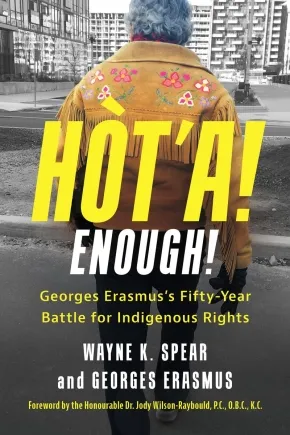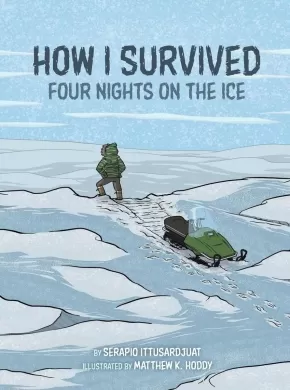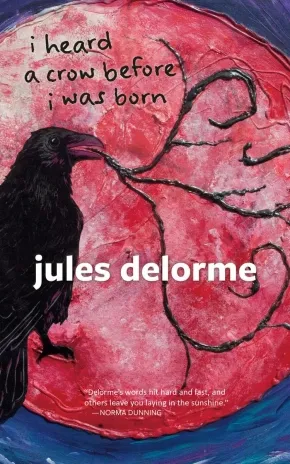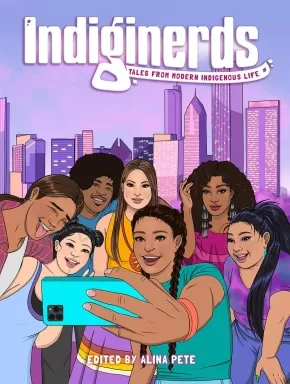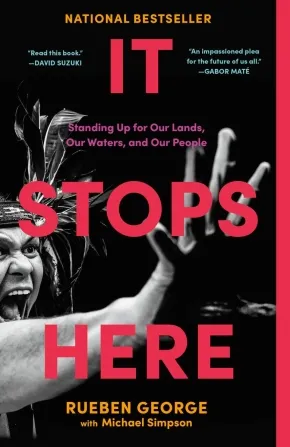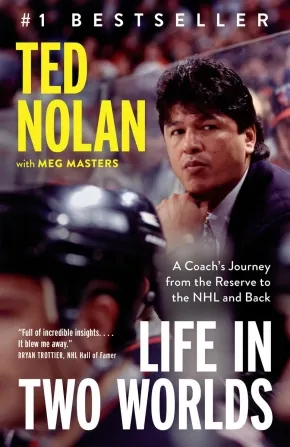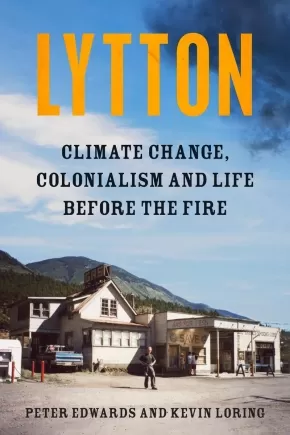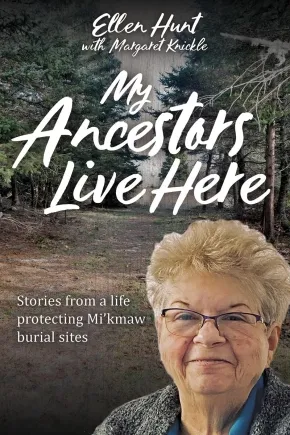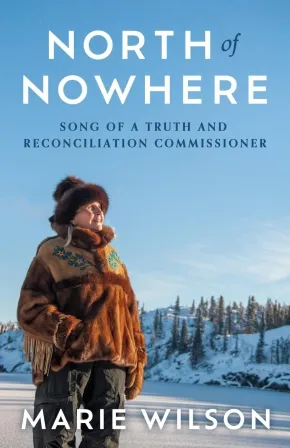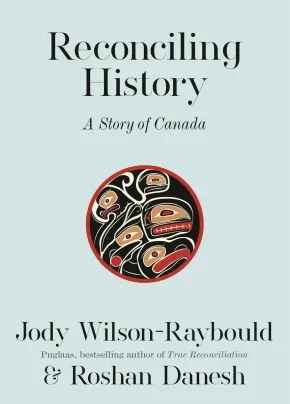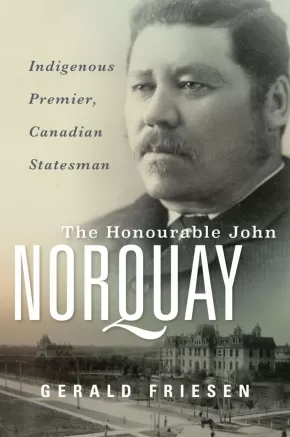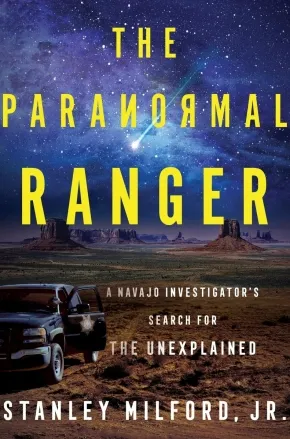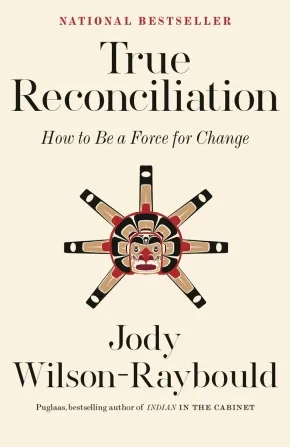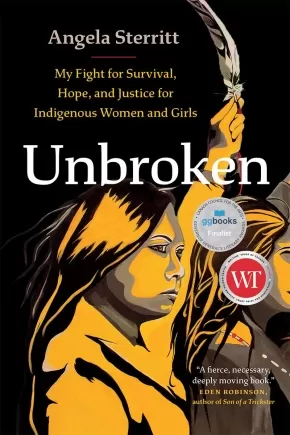
Biographies
31
-
45
of
233 Results;
Sort By
Go To
of 16
Hòt'a! Enough!: Georges Erasmus's Fifty-Year Battle for Indigenous Rights
$28.99
Format:
Paperback
Text Content Territories:
Indigenous Canadian; First Nations; Dene;
Reading Level: N/A
ISBN / Barcode: 9781459752900
Synopsis:
Synopsis:
The political life of Dene leader Georges Erasmus - a radical Native rights crusader widely regarded as one of the most important Indigenous leaders of the past fifty years.
For decades, Georges Erasmus led the fight for Indigenous rights. From the Berger Inquiry to the Canadian constitutional talks to the Oka Crisis, Georges was a significant figure in Canada's political landscape. In the 1990s, he led the Royal Commission on Aboriginal Peoples and afterward was chair and president of the Aboriginal Healing Foundation, around the time that Canada's residential school system became an ongoing frontpage story.
Georges's five-decade battle for Indigenous rights took him around the world and saw him sitting across the table from prime ministers and premiers. In the 1980s, when Georges was the National Chief of the Assembly of First Nations, he was referred to as the "Thirteenth Premier." This book tells the personal story of his life as a leading Indigenous figure, taking the reader inside some of Canada's biggest crises and challenges.
Awards
- 2025 Indigenous Voices Awards - Prose in English Award
Additional Information
320 pages | 6.00" x 9.00" | 57 b&w illustrations | Paperback
How I Survived: Four Nights on the Ice (PB)
$18.95
Artists:
Format:
Paperback
Text Content Territories:
Indigenous Canadian; Inuit;
ISBN / Barcode: 9781772274264
Synopsis:
Synopsis:
After his snowmobile breaks down halfway across the sea ice on a trip back from a fishing camp, Serapio Ittusardjuat recounts the traditional skills and knowledge he leaned on to stay alive.
This harrowing first-person account of four nights spent on the open sea ice—with few supplies and no water—shows young readers the determination and strength necessary to survive in the harsh Arctic climate, even when the worst occurs.
Awards
- 2022 Forest of Reading—Silver Birch Express Award
Reviews
"[T]he graphic novel How I Survived is a true story of Arctic survival written by Serapio Ittusardjuat, an Inuk stone carver and former mechanic.... This beautifully designed, highly engaging graphic novel should engross both reluctant readers and those seeking adventure." - Quill & Quire
Educator Information
Recommended for ages 12+
The original hardcover version was included in the Indigenous Books for Schools 2020/2021 resource list as being useful for grades 6 to 9 for English Language Arts and Social Studies.
Additional Information
48 pages | 7.25" x 9.75"
i heard a crow before i was born
$22.95
Format:
Paperback
Reading Level: N/A
ISBN / Barcode: 9781773104089
Synopsis:
Synopsis:
i heard a crow before i was born.
i heard tsó:ka’we before i was born.
i heard a crow before i was born opens with a dream-memory that transforms into a stark, poetic reflection on the generational trauma faced by many Indigenous families. Jules Delorme was born to resentful and abusive parents, in a world in which he never felt he belonged. Yet, buoyed by the love shown to him by his tóta (grandmother) and his many animal protectors, Delorme gained the strength to reckon with his brutal childhood and create this transformative and evocative memoir.
Across chapters that tell of his troubled relationships, Delorme unwraps the pain at the centre of his own story: the residential schools and the aftershocks that continue to reverberate.
In this stunning testament to the power of storytelling — to help us grieve and help us survive — Delorme tells the story of his spirit walk as he embraces the contradictions of his identity. As he writes, “i heard a crow before i was born is a man looking back, and dreaming back, and seeing that life, in whatever form it takes, however harsh it might seem, is beautiful.”
Reviews
“Jules Delorme is an unconventional storyteller and writer. His exploration of self through the eyes of being ‘half white on the reserve and half Indian in the city’ speaks to his vast experience as a Kanien’kehá:ka man in Canada. Jules has lived and continues to live the life of a man who has leapt over every hurdle that life places in front of him. To be able to write of his life in the way that he has shows his determination. Thank you, Jules, for taking us all on your spirit walk.” — Norma Dunning, award-winning author of Tainna, July 2024
“Sometimes difficult, always honest, i heard a crow before i was born takes us on a journey of trauma, and then healing. Told in a storytelling style, Delorme’s is a tale of survival.” — Drew Hayden Taylor, author of Motorcycles & Sweetgrass, July 2024
Additional Information
164 pages | 5.00" x 8.00" | Paperback
Indiginerds: Tales from Modern Indigenous Life
$30.95
Artists:
Format:
Paperback
Text Content Territories:
Indigenous Canadian;
ISBN / Barcode: 9781638991335
Synopsis:
Synopsis:
First Nations culture is living, vibrant, and evolving, and generations of Indigenous kids have grown up with pop culture creeping inexorably into our lives. From gaming to social media, pirate radio to garage bands, Star Trek to D&D, and missed connections at the pow wow, Indigenous culture is so much more than how it’s usually portrayed. Indiginerds is here to celebrate those stories!
Featuring an all-Indigenous creative team, Indiginerds is an exhilarating anthology collecting 11 stories about Indigenous people balancing traditional ways of knowing with modern pop culture. Includes work by Alina Pete, PJ Underwood, Kameron White, Rhael McGregory, and many more.
Educator Information
Recommended for ages 12 to 18.
Full Creator Listing: Tate Allen, Ida Aronson, Jordanna George, Raven John, Nipinet Landsem, Rhael McGregor, Sam “Mushki” Medlock, Alina Pete, Wren Rios, PJ Underwood, Kameron White
Additional Information
120 pages | 6.62" x 10.25" | Paperback
It Stops Here: Standing Up for Our Lands, Our Waters, and Our People (PB)
$24.00
Format:
Paperback
Text Content Territories:
Indigenous Canadian; First Nations; Salish; Coast Salish; Tsleil-Waututh;
ISBN / Barcode: 9780735242821
Synopsis:
Synopsis:
A personal account of one man’s confrontation with colonization that illuminates the philosophy and values of a First Nation on the front lines of the fight against an extractive industry, colonial government, and threats to the life-giving Salish Sea.
It Stops Here is the profound story of the spiritual, cultural, and political resurgence of a nation taking action to reclaim their lands, waters, law, and food systems in the face of colonization. In deeply moving testimony, it recounts the intergenerational struggle of the Tsleil-Waututh Nation to overcome colonial harms and the powerful stance they have taken alongside allies and other Indigenous nations across Turtle Island against the development of the Trans Mountain Pipeline—a fossil fuel megaproject on their unceded territories.
In a firsthand account of the resurgence told by Rueben George, one of the most prominent leaders of the widespread opposition to the Trans Mountain Pipeline expansion, It Stops Here reveals extraordinary insights and revelations from someone who has devoted more than a decade of his life to fighting the project. Rueben shares stories about his family’s deep ancestral connections to their unceded lands and waters, which are today more commonly known as Vancouver, British Columbia and the Burrard Inlet. He discloses how, following the systematic cultural genocide enacted by the colonial state, key leaders of his community, such as his grandfather, Chief Dan George, always taught the younger generations to be proud of who they were and to remember the importance of their connection to the inlet.
Part memoir, part call to action, It Stops Here is a compelling appeal to prioritize the sacred over oil and extractive industries, while insisting that settler society honour Indigenous law and jurisdiction over unceded territories rather than exploiting lands and reducing them to their natural resources.
Additional Information
288 pages | 5.13" x 7.98" | 31 b+w images throughout | Paperback
Life in Two Worlds: A Coach's Journey from the Reserve to the NHL and Back (PB)
$23.00
Format:
Paperback
Text Content Territories:
Indigenous Canadian; First Nations; Anishinaabeg; Ojibway; Ketegaunseebee (Garden River First Nation);
Reading Level: N/A
ISBN / Barcode: 9780735244979
Synopsis:
Synopsis:
In 1997 Ted Nolan won the Jack Adams Award for best coach in the NHL. But he wouldn’t work in pro hockey again for almost a decade. What happened?
Growing up on a First Nation reserve, young Ted Nolan built his own backyard hockey rink and wore skates many sizes too big. But poverty wasn’t his biggest challenge. Playing the game meant spending his life in two worlds: one in which he was loved and accepted and one where he was often told he didn’t belong.
Ted proved he had what it took, joining the Detroit Red Wings in 1978. But when his on-ice career ended, he discovered his true passion wasn’t playing; it was coaching. First with the Soo Greyhounds and then with the Buffalo Sabres, Ted produced astonishing results. After his initial year as head coach with the Sabres, the club was being called the “hardest working team in professional sports.” By his second, they had won their first Northeast Division title in sixteen years.
Yet, the Sabres failed to re-sign their much-loved, award-winning coach.
Life in Two Worlds chronicles those controversial years in Buffalo—and recounts how being shut out from the NHL left Ted frustrated, angry, and so vulnerable he almost destroyed his own life. It also tells of Ted’s inspiring recovery and his eventual return to a job he loved. But Life in Two Worlds is more than a story of succeeding against the odds. It’s an exploration of how a beloved sport can harbour subtle but devastating racism, of how a person can find purpose when opportunity and choice are stripped away, and of how focusing on what really matters can bring two worlds together.
Reviews
"Full of incredible insights into a tough life that Teddy’s perseverance turned into inspiration. It blew me away.”—Bryan Trottier, NHL Hall of Famer
“Ted’s beautiful memoir follows a trail of losses and the pain of getting well, and his stunning successes, lifting trophies, lifting lives. Ted was able to reach so many things, but his truth went beyond these things, and it’s the story of how he went beyond, to keep what was true in front of him that makes this book so enjoyable, and so important.”—Ron MacLean, CBC sportscaster and host of Hockey Night in Canada
“Ted Nolan’s story is truly remarkable. Ted persevered and overcame significant obstacles at a time when Indigenous people were not encouraged, applauded, or even wanted in elite hockey leagues. Ted broke barriers, battled racism, worked hard, and not only became an NHL player but also an elite junior, NHL, and international coach. Ted paved the way for many Indigenous youth to not only participate, but succeed in hockey arenas across North America and Europe as coaches and players.”—Phil Fontaine, former National Chief of the Assembly of First Nations
“Playing for Ted Nolan is one of my fondest memories. People called us “The Hardest Working Team in Hockey” and that doesn’t happen without a coach who can show each player their purpose and prove his belief in them. We all played beyond our own abilities for Ted. We led the NHL in penalty minutes and no team wanted to play us in our building. I respect Ted as a coach both on and off the ice, and this book gives a hint of why he inspires that in players and in people in general.”—Rob Ray, broadcaster and former NHLer
“Teddy was my favourite coach, mentor and friend. I love Ted Nolan. This book gives a good sense of what makes him so special.”—Brad May, former NHLer, Stanley Cup winner, and AT&T SportsNet analyst
“My father was so proud of Ted; he understood what he was going through. A story of perseverance, Life in Two Worlds is a great read for any generation."—Neil Sasakamoose, son of Fred Sasakamoose, the NHL’s first Treaty Indigenous player and bestselling author of Call Me Indian
Additional Information
336 pages | 5.11" x 7.97" | 8-page colour insert | Paperback
Lytton: Climate Change, Colonialism and Life Before the Fire
$36.00
Format:
Hardcover
Text Content Territories:
Indigenous Canadian; First Nations; Salish; Interior Salish; Nlaka'pamux (Thompson);
Reading Level: N/A
ISBN / Barcode: 9781039006157
Synopsis:
Synopsis:
From bestselling true-crime author Peter Edwards and Governor General's Award-winning playwright Kevin Loring, two sons of Lytton, BC, the town that burned to the ground in 2021, comes a meditation on hometown―when hometown is gone.
Before it made global headlines as the small town that burned down during a record-breaking heat wave in June 2021, while briefly the hottest place on Earth, Lytton, British Columbia, had a curious past. Named for the author of the infamous line, “It was a dark and stormy night,” Lytton was also where Peter Edwards, organized-crime journalist and author of seventeen non-fiction books, spent his childhood. Although only about 500 people lived in Lytton, Peter liked to joke that he was only the second-best writer to come from his tiny hometown. His grade-school classmate’s nephew Kevin Loring, Nlaka’pamux from Lytton First Nation, had grown up to be a Governor General's Award-winning playwright.
The Nlaka’pamux called Lytton “The Centre of the World,” a view Buddhists would share in the late twentieth century, as they set up a temple just outside town. In modern times, many outsiders would seek shelter there, often people who just didn’t fit anywhere else and were hoping for a little anonymity in the mountains. You’ll meet a whole cast of them in this book.
A gold rush in 1858 saw conflict with a wave of Californians come to a head with the Canyon War at the junction of the mighty Fraser and Thompson rivers, one that would have changed the map of what was soon to become Canada had the locals lost. The Nlaka’pamux lost over thirty lives in that conflict, as did the American gold seekers. A century later, Lytton hadn’t changed much. It was always a place where the troubles of the world seemed to land, even if very few people knew where it was.
This book is the story of Lytton, told from a shared perspective, of an Indigenous playwright and the journalist son of a settler doctor who quietly but sternly pushed back against the divisions that existed between populations (Dr. Edwards gladly took a lot of salmon as payment for his services back in the 1960s). Portrayed with all the warmth, humour and sincerity of small-town life, the colourful little town that burned to the ground could be every town’s warning if we don’t take seriously what this unique place has to teach us.
Additional Information
376 pages | 6.00" x 9.00" | Hardcover
Métis Matriarchs: Agents of Transition
$34.95
Editors:
Format:
Paperback
Text Content Territories:
Indigenous Canadian; Métis;
Reading Level: N/A
ISBN / Barcode: 9781779400116
Synopsis:
Synopsis:
Explores the integral roles that Métis women assumed to ensure the survival of their communities during the fur trade era and onward
Métis Matriarchs examines the roles of prominent Métis women from across Western Canada from the late 19th to the mid-20th century, providing a rare glimpse into the everyday lives of these remarkable women who were recognized as Matriarchs and respected for their knowledge, expertise, and authority within their families and communities.
This edited collection provides an opportunity to learn about the significant contributions made by Métis women during a transitional period in Western Canadian history as the fur trade gave way to a more sedentary, industrialized, and agrarian economy. Challenging how we think about Western Canadian settlement processes that removed Indigenous peoples from the land, this collection of stories examines the ways Métis matriarchs responded to colonial and settler colonial interventions into their lives and livelihoods and ultimately ensured the cultural survival of their communities.
Awards
- 2025 Canadian Historical Association Indigenous History Book Prize
Reviews
“A nuanced account of the lives of Métis women and their vital roles as they helped guide their families and communities through generations of transitions.” —Michel Hogue, author of Metis and the Medicine Line
Additional Information
336 pages | 5.00" x 8.00"| Paperback
My Ancestors Live Here: Stories from a Life Protecting Mi'kmaw Burial Sites
$24.95
Format:
Paperback
Text Content Territories:
Indigenous Canadian; First Nations; Mi'kmaq (Mi'gmaq); Qalipu First Nation;
Reading Level: N/A
ISBN / Barcode: 9781459507494
Synopsis:
Synopsis:
For over twenty years, Mi’kmaw Elder Ellen Hunt has been identifying, researching and fighting to protect Mi’kmaw burial sites in Nova Scotia which have long been forgotten, neglected and destroyed.
Moved by a powerful call from her ancestors, Ellen Hunt’s work has taken her to burial sites ranging from Nova Scotia’s South Shore to Cape Breton. This memoir chronicles her childhood growing up in a Mi’kmaw community in Newfoundland and her activist work through to the present day. Ellen also shares the many challenges she has faced – from indifferent politicians to antagonistic locals.
This memoir incorporates stories about the long Mi’kmaw history of the sites Ellen has identified and the teachings of her Mi’kmaw ancestors which have shaped her life and her work.
Additional Information
6.02" x 9.01" | 20+ colour and black and white images | Paperback
North of Nowhere: Song of a Truth and Reconciliation Commissioner
$34.99
Format:
Hardcover
Text Content Territories:
Indigenous Canadian; First Nations; Inuit; Métis;
ISBN / Barcode: 9781487011482
Synopsis:
Synopsis:
The incomparable first-hand account of the historic Truth and Reconciliation Commission of Canada told by one of the commissioners who led it.
The Truth and Reconciliation Commission was established to record the previously hidden history of more than a century of forced residential schooling for Indigenous children. Marie Wilson helped lead that work as one of just three commissioners. With the skills of a journalist, the heart of a mother and grandmother, and the insights of a life as the spouse of a residential school survivor, Commissioner Wilson guides readers through her years witnessing survivor testimony across the country, providing her unique perspective on the personal toll and enduring public value of the commission. In this unparalleled account, she honours the voices of survivors who have called Canada to attention, determined to heal, reclaim, and thrive.
Part vital public documentary, part probing memoir, North of Nowhere breathes fresh air into the possibilities of reconciliation amid the persistent legacy of residential schools. It is a call to everyone to view the important and continuing work of reconciliation not as an obligation but as a gift.
Reviews
"I found Marie Wilson's North of Nowhere profoundly moving and surprisingly optimistic. With humility and wisdom, she takes us behind the scenes of the Truth and Reconciliation Commission. As a non-Indigenous woman long settled in the North, she has a unique viewpoint, and she leavens an account of the traumatic intergenerational impact of residential schools with details from her own personal story. Wilson goes beyond the grief and misery triggered by the Truth aspect of the TRC to suggest the joy and laughter that true Reconciliation can produce in survivors. But reconciliation will be achieved only if we don't look away. North of Nowhere is a powerful book that shifted my perspective, and, thanks to Wilson's lucid prose, helps the rest of us glimpse what is needed." — Charlotte Gray (CM), author of Passionate Mothers, Powerful Sons: The Lives of Jennie Jerome Churchill and Sara Delano Roosevelt
"For anyone wanting a front row seat to the Spirit, the vision, and the mechanics of the Truth and Reconciliation Commission of Canada, North of Nowhere is definitely it. Commissioner Dr. Marie Wilson recounts and celebrates the courage of everyone involved in one of Canada's most important chapters of coming to terms with residential school Survivors and their families and their communities forever changed with a policy of cultural genocide. I hope everyone reads this and finds their way to support Survivors, their families, and their communities as they continue to reclaim so much of what was stolen. What a profound and riveting read." — Richard Van Camp, author of The Lesser Blessed and Godless but Loyal to Heaven
"The long-matured work of a true elder, this magnificent book is a sober masterpiece of sacred activism. It deserves to be read by everyone aghast at the chaos and cruelty of our world. Its level decency of tone, its lucidity, its determined hope in terrible circumstances both transmit and model those qualities we all now need to build a new world out of the smouldering ashes of the old." — Andrew Harvey, author of The Hope: A Guide to Sacred Activism
"In North of Nowhere, Marie Wilson honours her vow to residential school Survivors to 'do no harm' and to bear witness to and honour their experiences. Marie has achieved her purpose to educate readers and inspire reconciliation and, most importantly, hope. 'I see you. I hear you. I believe you. And I love you'-Marie's words as a Commissioner to Survivors set the tone for this very important book." — Perry Bellegarde, former National Chief of the Assembly of First Nations
"This book is one of the best I've ever read. It made me laugh, get emotional, and helped reset my journey on the role I need to play. As a child of residential school Survivors, I was motivated to continue to learn my language and strengthen my pride as an Indigenous person. Truth must come before reconciliation; this book will empower Canadians to focus on what we can control today when it comes to implementing the Calls to Action. This book advocates for building awareness, understanding, and long-term relationships between Indigenous people and Canadians. If every Canadian reads this book, the Truth and Reconciliation Calls to Action can be achieved." — Cadmus Delorme, former chief of Cowessess First Nation
"Journalist Marie Wilson brings us into the emotion-charged rooms, the sacred spaces of Canada's Truth and Reconciliation hearings. She listens with the heart of a mother, looking into the souls of the adult Survivors standing before her and seeing the children they once were. Though she holds nothing back, in the end this is a triumphant, restorative narrative-a testament to the healing that happens when we share our deepest, darkest truths." — Judy Rodgers, founding director of Images & Voice of Hope, board member of The Peace Studio
"North of Nowhere is the story of a national soul-searching, braided with Dr. Marie Wilson's own personal story and her unique perspective as a Truth and Reconciliation Commissioner. Every page tells a story. This is a book that is bound to ignite dialogue. It has been a catalyst that has been the spark for numerous visits, deep discussions, and reflections, which is why we wanted to write a collective review. Marie's writing had us thinking and talking about the stories, truths, and wisdom shared throughout the pages. Through her writing, Marie elicits emotional and insightful responses that move us along our own journeys of understanding the truth of Canada." — Shelagh Rogers and Monique Gray Smith
"Marie Wilson is the truth keeper entrusted with the accounts of the First Nations, Métis, and Inuit children who went to residential schools, the memories of those who did not make it home and the fate of us all if we do not learn from the past. The savagery of 'civilization' comes into stark relief as children emerge from the pages to awaken the national consciousness and render the TRC Calls to Action imperative." — Cindy Blackstock, executive director, First Nations Child & Family Caring Society
"Beautifully written, Marie Wilson's North of Nowhere is a stunning work of truth, power, and wisdom. An imperative read for all Canadians to understand the layers of shrapnel left by the residential school system that will leave you with emotion and hope. Wilson is an incredibly brilliant and gifted writer." — Angela Sterritt, author of Unbroken: My Fight for Survival, Hope, and Justice for Indigenous Women and Girls
Educator Information
Curriculum Connections: Social Science, Ethnic Studies, Canadian Studies, Indigenous STudies
Additional Information
384 pages | 6.00" x 9.00" | Hardcover
Reconciling History: A Story of Canada
$39.95
Format:
Hardcover
Text Content Territories:
Indigenous Canadian;
Reading Level: N/A
ISBN / Barcode: 9780771017230
Synopsis:
Synopsis:
From the #1 national bestselling author of 'Indian' in the Cabinet and True Reconciliation, a truly unique history of our land—powerful, devastating, remarkable—as told through the voices of both Indigenous and non-Indigenous peoples.
The totem pole forms the foundation for this unique and important oral history of Canada. Its goal is both toweringly ambitious and beautifully direct: To tell the story of this country in a way that prompts readers to look from different angles, to see its dimensions, its curves, and its cuts. To see that history has an arc, just as the totem pole rises, but to realize that it is also in the details along the way that important meanings are to be found. To recognize that the story of the past is always there to be retold and recast, and must be conveyed to generations to come. That in the act of re-telling, meaning is found, and strength is built.
When it comes to telling the history of Canada, and in particular the history of the relationship between Indigenous and non-Indigenous peoples, we need to accept that the way in which our history has traditionally been told has not been a common or shared enterprise. In many ways, it has been an exclusive and siloed one. Among the countless peoples and groups that make up this vast country, the voices and experiences of a few have too often dominated those of many others.
Reconciling History shares voices that have seldom been heard, and in this ground-breaking book they are telling and re-telling history from their perspectives. Born out of the oral history in True Reconciliation, and complemented throughout with stunning photography and art, Reconciling History takes this approach to telling our collective story to an entirely different level.
Additional Information
304 pages | 6.25" x 8.75" | Hardcover
The Honourable John Norquay: Indigenous Premier, Canadian Statesman
$39.95
Format:
Hardcover
Text Content Territories:
Indigenous Canadian; Métis;
Reading Level: N/A
ISBN / Barcode: 9781772840582
Synopsis:
Synopsis:
The life and times of the Premier from Red River
John Norquay, orphan and prodigy, was a leader among the Scots Cree peoples of western Canada. Born in the Red River Settlement, he farmed, hunted, traded, and taught school before becoming a legislator, cabinet minister, and, from 1878 to 1887, premier of Manitoba.
Once described as Louis Riel's alter ego, he skirmished with prime minister John A. Macdonald, clashed with railway baron George Stephen, and endured racist taunts while championing the interests of the Prairie West in battles with investment bankers, Ottawa politicians, and the CPR. His contributions to the development of Canada's federal system and his dealings with issues of race and racism deserve attention today.
Recounted here by Canadian historian Gerald Friesen, Norquay's life story ignites contemporary conversations around the nature of empire and Canada's own imperial past. Drawing extensively on recently opened letters and financial papers that offer new insights into his business, family, and political life, Friesen reveals Norquay to be a thoughtful statesman and generous patriarch. This masterful biography of the Premier from Red River sheds welcome light on a neglected historical figure and a tumultuous time for Canada and Manitoba.
Reviews
"The Honourable John Norquay is a magisterial biography that brings Norquay out of the historical shadows to a prominent place among the major figures of nineteenth century Canada. One of the most important historical studies of this decade, Norquay is a model of how superb historical scholarship can make us better understand both past and present." — John English
"This is a beautifully written, extremely accessible, but obviously meticulous scholarly tome. Friesen wrangles a wide variety of facts into a compelling narrative." — Chris Andersen
"The Honourable John Norquay is a magnificent book. Friesen meticulously documents Norquay's many accomplishments, larger-than-life character, and charisma. He paints a picture of a negotiator and orator who ably uses humour and personal stories to win support, especially in the midst of the racism he faced." — Gary Doer, Premier of Manitoba, 1999-2009
Educator Information
Table of Contents
Introduction
Ch 1: “A Merry Prankish Youngster,” 1841–58
Ch 2: Red River Family, 1859–70
Ch 3: “The Transfer Made Us Wise,” the 1870s
Ch 4: Public Life: An Introduction, 1871–74
Ch 5: Senior Minister, 1875–78
Ch 6: Premier, 1879
Ch 7: Boom Times and Crash, 1880–January 1883
Ch 8: “Chief,” 1883–February 1885
Ch 9: “An Unfortunate Family Difference,” 1885
Ch 10: Vindication, 1886
Ch 11: Defiance, 1887
Ch 12: Downfall, November–December 1887
Ch 13: Dénouement, 1888–89
Conclusion
Acknowledgements
Abbreviations
Keywords
A Note on Sources
Notes
Bibliography
Index
Additional Information
619 pages | 6.12" x 9.25" | b&w illustrations, maps, index, bibliography | Hardcover
The Paranormal Ranger: A Navajo Investigator's Search for the Unexplained (HC) (5 in Stock)
$35.99
Format:
Hardcover
Text Content Territories:
Indigenous American; Native American; Cherokee; Navajo (Diné);
Reading Level: N/A
ISBN / Barcode: 9780063371057
Synopsis:
Synopsis:
A Navajo Ranger’s chilling and clear-eyed memoir of his investigations into bizarre cases of the paranormal and unexplained in Navajoland
As a Native American with parents of both Navajo and Cherokee descent, Stanley Milford Jr. grew up in a world where the supernatural was both expected and taboo, where shapeshifters roamed, witchcraft was a thing to be feared, and children were taught not to whistle at night.
In his youth, Milford never went looking for the paranormal, but it always seemed to find him. When he joined the fabled Navajo Rangers—a law enforcement branch of the Navajo Nation who are equal parts police officers, archeological conservationists, and historians—the paranormal became part of his job. Alongside addressing the mundane duties of overseeing the massive 27,000-square-mile reservation, Milford was assigned to utterly bizarre and shockingly frequent cases involving mysterious livestock mutilations, skinwalker and Bigfoot sightings, UFOs, and malicious hauntings.
In The Paranormal Ranger, Milford recounts the stories of these cases from the clinical and deductive perspective of a law enforcement officer. Milford’s Native American worldview and investigative training collide to provide an eerie account of what logic dictates should not be possible.
Reviews
“Stanley Milford Jr. masterfully intertwines memoir, Diné creation stories, and true encounters with otherworldly phenomena. As a Navajo Ranger, Milford’s path is shadowed by eerie cryptids, mysterious UFOs, and the ever-present trials of his demanding role. His unwavering dedication, bravery, and deep cultural insight transform this narrative into a mesmerizing journey. Bridging the realms of legend and reality, each spine-chilling investigation illuminates the enduring spirit and wisdom of the Navajo people, offering readers a profound and unforgettable cultural experience.”— Shane Hawk, co-editor of Never Whistle at Night: An Indigenous Dark Fiction Anthology
“Stan’s life story is a true testament to the reverence that Native American culture has for the paranormal. His passion for investigating the otherworldly really shines. A fascinating read, and highly recommended!” — Steve Gonsalves, star of Ghost Hunters and bestselling author of A Life with Ghosts
“Many of Stan’s experiences recounted in this book parallel what we’ve seen on Skinwalker Ranch, with an eerie degree of similarity. Getting to learn more about Stan’s life and his Navajo-Cherokee heritage alongside these incredible stories is a meaningful bonus.” — Jim Morse, ranch manager and cast member of The Secret of Skinwalker Ranch
"Milford interweaves colorful stories from Navajo mythology that illuminate cultural beliefs about the origins of life, monsters, and the spirit world. . . . Engaging reading for adventurous minds." — Kirkus Reviews
"Equal parts memoir and supernatural record, Milford's book shares how these occurrences enlightened him. He leaves the reader with a unified theory of how paranormal phenomena are connected and what this means for us as human beings. And he demonstrates how experience and open-mindedness can, over a lifetime, build up to unparalleled expertise." — Booklist
Additional Information
256 pages | 6.00" x 9.00" | Hardcover
True Reconciliation: How to Be a Force for Change (PB)
$23.00
Format:
Paperback
Text Content Territories:
Indigenous Canadian;
Reading Level: N/A
ISBN / Barcode: 9780771004407
Synopsis:
Synopsis:
There is one question Canadians have asked Jody Wilson-Raybould more than any other: What can I do to help advance reconciliation? It is clear that people from all over the country want to take concrete and tangible action that will make real change. We just need to know how to get started. This book provides that next step. For Wilson-Raybould, what individuals and organizations need to do to advance true reconciliation is self-evident, accessible, and achievable. True Reconciliation is broken down into three core practices—Learn, Understand, and Act—that can be applied by individuals, communities, organizations, and governments.
The practices are based not only on the historical and contemporary experience of Indigenous peoples in their relentless efforts to effect transformative change and decolonization, but also on the deep understanding and expertise about what has been effective in the past, what we are doing right, and wrong, today, and what our collective future requires. Fundamental to a shared way of thinking is an understanding of the Indigenous experience throughout the story of Canada. In a manner that reflects how work is done in the Big House, True Reconciliation features an “oral” history of these lands, told through Indigenous and non-Indigenous voices from our past and present.
The ultimate and attainable goal of True Reconciliation is to break down the silos we’ve created that prevent meaningful change, to be empowered to increasingly act as “inbetweeners,” and to take full advantage of this moment in our history to positively transform the country into a place we can all be proud of.
Additional Information
352 pages | 5.17" x 7.99" | Paperback
Unbroken: My Fight for Survival, Hope, and Justice for Indigenous Women and Girls (PB)
$24.95
Format:
Paperback
Text Content Territories:
Indigenous Canadian; First Nations; Gitxsan (Gitksan);
Grade Levels: 12; University/College;
ISBN / Barcode: 9781778402142
Synopsis:
Synopsis:
Unbroken is an extraordinary work of memoir and investigative journalism focusing on missing and murdered Indigenous women and girls, written by an award-winning Gitxsan journalist who survived life on the streets against all odds.
As a Gitxsan teenager navigating life on the streets, Angela Sterritt wrote in her journal to help her survive and find her place in the world. Now an acclaimed journalist, she writes for major news outlets to push for justice and to light a path for Indigenous women, girls, and survivors. In her brilliant debut, Sterritt shares her memoir alongside investigative reporting into cases of missing and murdered Indigenous women in Canada, showing how colonialism and racism led to a society where Sterritt struggled to survive as a young person, and where the lives of Indigenous women and girls are ignored and devalued.
Growing up, Sterritt was steeped in the stories of her ancestors: grandparents who carried bentwood boxes of berries, hunted and trapped, and later fought for rights and title to that land. But as a vulnerable young woman, kicked out of the family home and living on the street, Sterritt inhabited places that, today, are infamous for being communities where women have gone missing or been murdered: Vancouver's Downtown Eastside, and, later on, Northern BC's Highway of Tears. Sterritt faced darkness: she experienced violence from partners and strangers and saw friends and community members die or go missing. But she navigated the street, group homes, and SROs to finally find her place in journalism and academic excellence at university, relying entirely on her own strength, resilience, and creativity along with the support of her ancestors and community to find her way.
"She could have been me," Sterritt acknowledges today, and her empathy for victims, survivors, and families drives her present-day investigations into the lives of missing and murdered Indigenous women. In the end, Sterritt steps into a place of power, demanding accountability from the media and the public, exposing racism, and showing that there is much work to do on the path towards understanding the truth. But most importantly, she proves that the strength and brilliance of Indigenous women is unbroken, and that together, they can build lives of joy and abundance.
Reviews
"Sterritt's story is living proof of how courageous Indigenous women are. Listen to her voice and hear the sound of the land, hear the sound of our women weeping but also raging—refusing to be neglected or ignored any longer."—Tanya Talaga, author of Seven Fallen Feathers and All Our Relations
"A fierce, necessary, deeply moving book. Sterritt uses her difficult personal journey to frame the terrible history of missing and murdered Indigenous women in Canada. Haunting and illuminating."— Eden Robinson, author of Son of a Trickster
"Angela Sterritt takes on Canada's deeply flawed justice system, deftly exposing systemic racism and the continuing impacts of colonialism. This book is a compelling read and a well-researched and powerful heart-centered memoir."—Lorimer Shenher, author of That Lonely Section of Hell
"With facts and humanity, Angela Sterritt effortlessly draws us into this emotional and important read. A courageous Indigenous voice who uses her personal journey to educate all of us about critical and urgent issues we must address, including Missing and Murdered Indigenous Women and Girls."— Jody Wilson-Raybould
"A new clear, compelling, and urgent voice illuminates a critical topic of our times with the passion and profound caring of a devoted sister. A tour de force."—Darrel McLeod, author of Mamaskatch and Peyakow
"A remarkable life story. . . Angela Sterritt is a formidable storyteller and a passionate advocate."—Cherie Dimaline, author of The Marrow Thieves
"[A] thought-provoking memoir. . . Beginning with a haunting list of names of Indigenous women and girls who were either murdered or missing along the Highway of Tears, the book tells the stories of such ignored and abused victims. . . The final product is eyeopening, making use of tragic firsthand accounts from grieving families and Sterritt's personal memories, all raw and rich with detail. . . [P]owerful."—Foreword Reviews
Additional Information
6.00" x 9.00" | Paperback
Sort By
Go To
of 16

